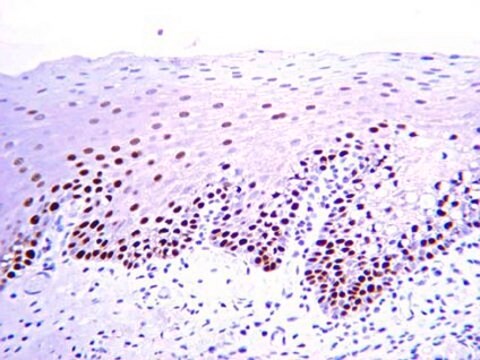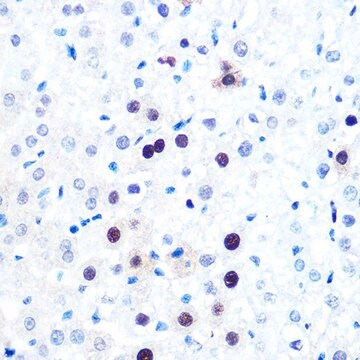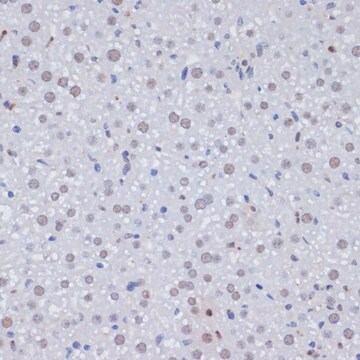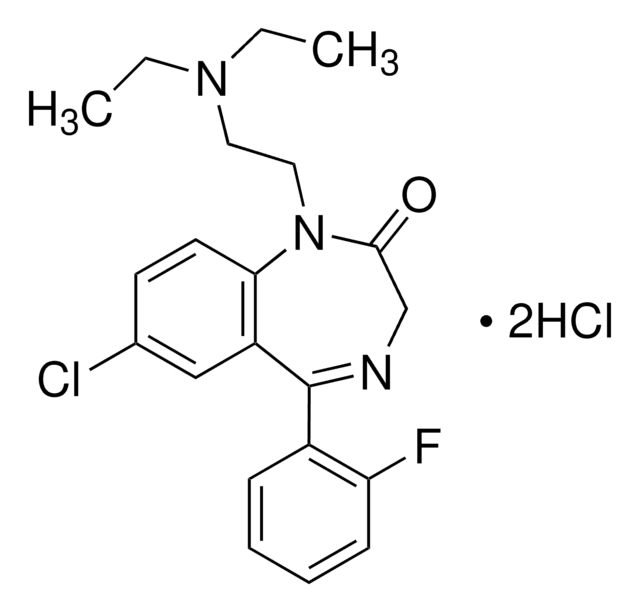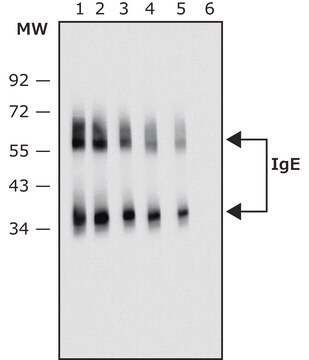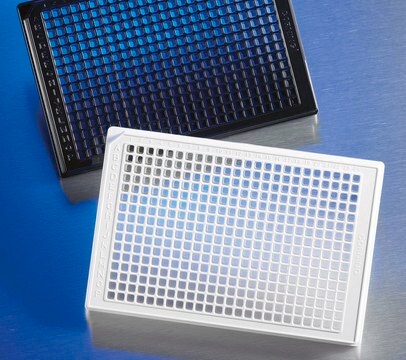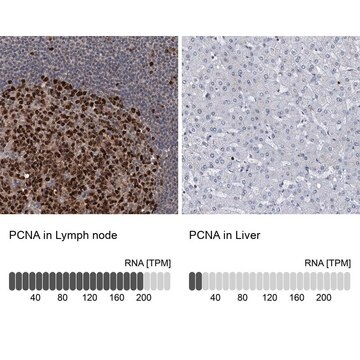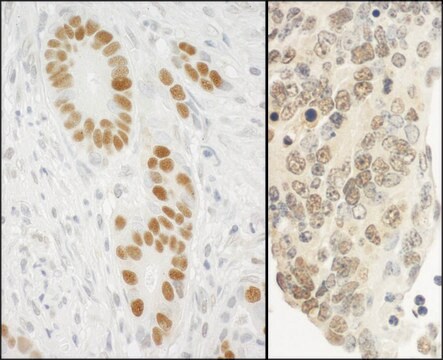추천 제품
생물학적 소스
rabbit
Quality Level
항체 형태
affinity purified immunoglobulin
항체 생산 유형
primary antibodies
Grade
Powered by Bethyl Laboratories, Inc.
종 반응성
human, mouse
기술
flow cytometry: 0.03 μg
immunohistochemistry: 1:2,000- 1:10,000
immunoprecipitation (IP): 2- 5 μg/mg
western blot: 1:1,000- 1:10,000
수납 번호(accession number)
P12004
UniProt 수납 번호
배송 상태
wet ice
저장 온도
2-8°C
타겟 번역 후 변형
unmodified
유전자 정보
rabbit ... PCNA(5111)
일반 설명
Proliferating cell nuclear antigen (PCNA), a single-copy gene, spans about 12 kb. This gene is located on human chromosome 20p13. PCNA is expressed at high levels in the thymus, bone marrow, fetal liver, and some cells of the small intestine and colon. It is located in the nucleus.
면역원
The epitope recognized by PLA0079 maps to a region between residues 75 and 125 of human proliferating cell nuclear antigen using the numbering given in SwissProt entry P12004 (GeneID 5111).
애플리케이션
Rabbit anti-PCNA Antibody, Affinity Purified has been used in:
- proximity ligation assay (PLA) (1:500)
- immunoblotting (1:2000)
- flow cytometry analysis
생화학적/생리학적 작용
Proliferating cell nuclear antigen (PCNA) protein functions as an auxiliary factor of polymerase δ. It acts as a cofactor to polymerase ε, polymerase β, and translesion synthesis polymerases, such as η, κ, λ, and θ. In chronic lymphoid leukemia (CLL) patients, intracellular levels of PCNA protein can be used as a marker to identify clinical behavior and survival.
물리적 형태
Tris-citrate/phosphate buffer, pH 7 to 8 containing 0.09% Sodium Azide
기타 정보
PCNA (Proliferating Cell Nuclear Antigen) was first identified as a factor expressed in the nuclei of replicating cells. PCNA plays a role in both DNA synthesis and repair. PCNA functions as a processivity factor for DNA polymerase by acting as a DNA clamp that tethers the polymerase catalytic units to the DNA template. The structure of PCNA is that of a trimeric ring that encircles and slides along replicating DNA. PCNA interacts with and is regulated by several proteins involved in cell cycle control and check point processes.
면책조항
Unless otherwise stated in our catalog or other company documentation accompanying the product(s), our products are intended for research use only and are not to be used for any other purpose, which includes but is not limited to, unauthorized commercial uses, in vitro diagnostic uses, ex vivo or in vivo therapeutic uses or any type of consumption or application to humans or animals.
적합한 제품을 찾을 수 없으신가요?
당사의 제품 선택기 도구.을(를) 시도해 보세요.
Storage Class Code
12 - Non Combustible Liquids
WGK
nwg
Flash Point (°F)
Not applicable
Flash Point (°C)
Not applicable
가장 최신 버전 중 하나를 선택하세요:
Qun Wang et al.
Heart, lung & circulation, 25(11), 1124-1132 (2016-05-18)
Coronary artery bypass grafting is employed for the treatment of multiple-vessel lesions. Studies have shown that continued maladaptive remodelling expedites atherosclerosis and that excessive remodelling leads to graft restenosis. However, few studies have focussed on mechanistic target of rapamycin (mTOR)
James P Wells et al.
PLoS genetics, 18(12), e1010309-e1010309 (2022-12-09)
DNA replication is a vulnerable time for genome stability maintenance. Intrinsic stressors, as well as oncogenic stress, can challenge replication by fostering conflicts with transcription and stabilizing DNA:RNA hybrids. RAD18 is an E3 ubiquitin ligase for PCNA that is involved
Emily Yun-Chia Chang et al.
Nature communications, 10(1), 4265-4265 (2019-09-21)
Ectopic R-loop accumulation causes DNA replication stress and genome instability. To avoid these outcomes, cells possess a range of anti-R-loop mechanisms, including RNaseH that degrades the RNA moiety in R-loops. To comprehensively identify anti-R-loop mechanisms, we performed a genome-wide trigenic
Sangin Kim et al.
Nucleic acids research, 48(13), 7218-7238 (2020-06-17)
R-loops are formed when replicative forks collide with the transcriptional machinery and can cause genomic instability. However, it is unclear how R-loops are regulated at transcription-replication conflict (TRC) sites and how replisome proteins are regulated to prevent R-loop formation or
Hui-Xin Liu et al.
Biochemical pharmacology, 91(2), 256-265 (2014-08-05)
All-trans retinoic acid (RA) is a potent inducer of regeneration. Because the liver is the principal site for storage and bioactivation of vitamin A, the current study examines the effect of RA in mouse hepatocyte proliferation and liver regeneration. Mice
자사의 과학자팀은 생명 과학, 재료 과학, 화학 합성, 크로마토그래피, 분석 및 기타 많은 영역을 포함한 모든 과학 분야에 경험이 있습니다..
고객지원팀으로 연락바랍니다.